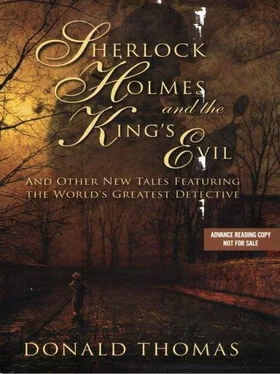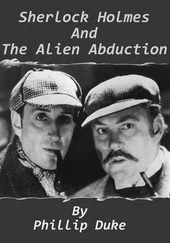“Howell and the fledgling poet exchanged letters, in which these rather childish goings-on were much discussed. At the peak of his fame, ten years later, Mr Swinburne received a message from his former acquaintance. Howell had pasted all the poet’s letters into a keepsake album. Having fallen into penury, he had been obliged to pawn it. Now he had not the money to redeem it. The pawnbroker had lost patience and proposed to offer it immediately for public sale. Within the week, Admiral and Lady Jane Swinburne paid a very large sum to buy back from the money-lender this chronicle of their son’s youthful folly. The proceeds were no doubt shared gleefully between Howell and his accomplice pawnbroker. Now, make what you can of that, friend Lestrade.”
Lestrade recovered himself.
“Strike me down!” he said thoughtfully, “As neat a piece of stitching as I ever heard of!”
“Precisely. On other occasions, where a client was difficult, Howell would encourage him by giving well-publicised readings from such compromising correspondence to groups of invited guests-until the author was minded to buy back his indiscretions. Do you really believe that having gone to such lengths to conceal their son’s folly, the Swinburne parents would enter a witness-box and reveal it? In any case, could you prove blackmail in the matter of the pawned letters? Was it not, perhaps, a friendly warning from Howell, by which the author of the letters might mend the damage done? And as for recitals of the correspondence, if you were to send me a private letter and I were to read it to others, it is certainly not the act of a gentleman but it is hardly criminal.”
“And have you known this person for long, Mr Holmes?”
“I repeat that I cannot claim a close acquaintance, Lestrade.
Indeed, though I have heard of him several times, I have not seen him for almost ten years. That was when I represented a client, Mr Sidney Morse, in the so-called case of ‘The Owl and the Cabinet.’ Howell’s name had always been pronounced ‘Owl’ by the cockney Pre-Raphaelite painters and poets. They made a joke of it.”
Light was beginning to dawn behind Lestrade’s eyes.
“Was this matter of Mr Morse also to do with Mr Whistler, the American painter?”
“You are there before me, as usual, Lestrade. In 1878, Whistler was going to Venice. He had sold to Mr Morse a valuable Japanese cabinet, which had an upper and a lower half. Mr Whistler left delivery in the hands of Howell. Mr Morse came to Howell’s address on a Saturday, paid for the cabinet and was to have it after the weekend. The minute he left, Howell summoned a pawnbroker and pledged the cabinet to him for a considerable sum. The upper half went on a cart to the pawnshop, where Howell was paid. He promised to bring the lower half after the weekend.”
“I think I see the trick,” said Lestrade suddenly.
“Perhaps you do. On Monday, Howell delivered the lower half to Mr Morse. He claimed the upper half had been damaged in moving it. It had gone for repair and he would deliver it upon its return. Naturally he then informed Chapman, the pawnbroker, that it was the lower half which had been damaged and had gone for repair.”
Holmes drew breath and suppressed another onset of laughter.
“Howell then disappeared with both payments, leaving each dupe with half the cabinet. Both men trusted Howell. Knowing no better, they thought that half a cabinet is no use to a thief on its own. How little they knew Gussie! The legal proceedings necessary to settle the matter lasted for three years. During that time, my services were retained by Mr Morse. Mr Whistler on his return was obliged to redeem the lower half of the cabinet from the pawnbroker, repaying the loan as well as three years’ interest and restoring the furniture to its rightful purchaser. Mr Howell hastily advertised his own death again and yet another post-obit sale of his effects was held.”
Lestrade looked almost overwhelmed.
“Oh dear,” he said, “Oh dear, oh dear, oh dear!”
Holmes chuckled.
“One of the innocents at the sale was L. H. Myers, son and disciple of Frederick Myers of the Society for Psychical Research. The son was able to report to his father a celestial vision of ‘Howell deceased’ at Christie’s sale-room. The lad was examining a locket, said to contain the hair of Mary Queen of Scots. He felt convinced that the shade of it was wrong. At that moment, a vision of the dead sidled up to him and said, ‘I shouldn’t bid for that if I were you, it’s only Rosa Corder’s.’”
And Holmes began to guffaw again, quite helplessly.
I could not see that such a maelstrom of dishonesty and extortion was an occasion for quite so much merriment. But just then there was a tap at the sitting-room door, soon after nine o’clock, and Mrs Hudson’s “Buttons” appeared with a telegram envelope in his hand.
“Wire for Mr Lestrade, gentlemen. No reply expected.”
He proffered it to the Scotland Yard man and withdrew. We waited while Lestrade read it. Whatever the message, it seemed to restore confidence in the inspector, who had just had the wind taken out of his sails, so to speak. He looked up.
“Well, doctor! Well, Mr Holmes! Here’s one for you. You can believe what you like about Mr Howell. Here’s a message that came in less than an hour ago from a duty constable at the Home Hospital in Fitzroy Square.”
There was a twinkle in Holmes’s eye as he inquired.
“Are you quite sure, that the wire has not been sent to Scotland Yard by Howell himself, masquerading as the duty constable? He is more than capable of that!”
Lestrade glared at him-the only time I had ever seen such a thing-and continued to read.
“In Mr Howell’s greatcoat pocket they found a book, Sonnets by Mrs Elizabeth Barrett Browning. An old copy, by the look of it. Nothing else of value on him. Also, the last words that the poor fellow was able to articulate, several times over, were ‘Leaves of grass.’”
And so the sonnets came into the case, though as yet they meant nothing to me. But what had Howell to do with Walt Whitman?
“Leaves of Grass, by Mr Whitman,” I said quickly, for having read and greatly admired the new American poet I recognised the title of his work. “Does the message say whether Howell is now alive or dead?”
Before Lestrade could reply, Holmes cut in.
“Whatever the answer, in the case of Augustus Howell, I fear it is very little to be depended upon.”
And he chuckled again.
Lestrade was mollified by another glass of single malt and a cigar. That should have been end of the matter. A fortnight later, however, we received two visitors of a very different type. A few days previously Holmes had remarked to me that a Mr and Mrs Browning were coming to consult him at 2.30pm on 8 May over a matter of some delicacy, which they had not detailed in advance. I gathered that they were the son and daughter-in-law of the two great poets of that name.
The famous Robert Browning had died only the year before but the equally famous Mrs Elizabeth Barrett Browning had been dead for almost thirty years. The present visit of their descendants to us might seem a coincidence, after the discovery of the Sonnets in Howell’s pocket. Sherlock Holmes, however, was not a great believer in the law of coincidence. He lived in a world of cause and effect.
Mrs Hudson knocked on the door at the appointed hour and announced with a look of self-conscious formality,
“Mr Robert Wiedemann Penini Browning and Mrs Fannie Cornforth Browning.”
I recognised, as any reader of the newspapers might, the distinctive names of Robert Browning’s son. He was universally known as “Pen” Browning, an easy-going young man who had taken up painting and sculpture, rather than poetry. I found him slighter in build than I would have expected. At thirty, he had almost the look of a man who might not yet be fully grown. His face was still youthfully round, though with full dark whiskers and thinning hair. His was such a contrast to the bold head and profile of his late father. Fannie Cornforth Browning appeared several years his junior. She was a fine and handsome woman, rather plump and with the blue eyes and red hair of a Titian painting. She had been, as I understood from the newspapers, American by birth and English by upbringing.
Читать дальше












